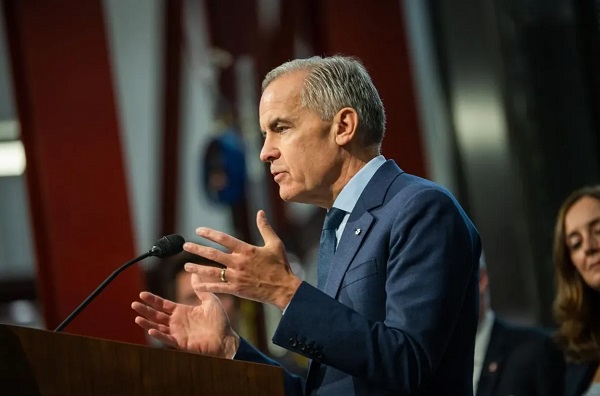Alberta
“…(Alberta’s) been booming so long that people think it’s our time to suffer…”

Producer Notes:
What an emotional piece of video here shared by Heidi, and the links between layoffs and suicide in Alberta. The data is very clear that there’s a direct correlation and an increase in suicide rates and what’s going on in our world gasps History and dad’s especially fathers can be under tremendous pressure if they’re the solo income earner for their family. Not only are you at high risk of financial collapse if you lose your job, but the emotional toll that that can take and the impact on your mental health, confidence. My heart goes out to families that are suffering…”
The following is a transcript of the above video interview with Heidi McKillop, Director, Producer “A Stranded Nation”.
“… The interesting thing about when you see this issue in the news about oil and gas and that we don’t need it, for instance, or that it’s dirty oil and then it’s getting displaced to another jurisdiction around the world is quite literally the impact it has had directly in this province.
I mean, you can see in downtown Calgary especially, but definitely in the rural communities as well, like Grande Prairie, you name it. There has been an unbelievable shift in terms of what communities are up against with layoffs, and there’s a part of a documentary — I don’t know if you know this, but there was an article, and it was the suicide rates going up 30 percent in Alberta that year.
I mean, it’s a debate of if that was directly related related to the recession or not, that was part of it. But there was certainly a connection between economic downturn and mental health issues on the rise.
And that article was actually about a little girl that had killed herself because her dad had lost his job. And it was a really, really sad article, and I just said to myself, I was like, if people can’t have compassion about the fact that people are drastically getting affected in their family lives, then that’s probably not the messaging that we’re trying to reach to those people, because they are obviously showing a lack of compassion in that area. And that, to me, is very sad to see because it happens quite often.
Especially when I go home, you know, Alberta’s been booming for so many years and so many decades, people just think we’ve been booming for so long and long enough that it’s our time to suffer. But that’s just not the way that we should start thinking. It’s very dangerous. Yeah, it makes me so angry actually. Yeah, it’s pretty rough.
Heidi McKillop, Director, Producer “A Stranded Nation”
https://twitter.com/heidimckillop?lang=en
Read more stories from WeMaple.
Alberta
Coutts border officers seize 77 KG of cocaine in commercial truck entering Canada – Street value of $7 Million

News release from RCMP Federal Policing Northwest Region
Calgary resident charged with attempted drug importation
Canada Border Services Agency (CBSA) officers at the Coutts port of entry found nearly 77 kg of cocaine with an estimated street value of $7 million during a secondary examination of a commercial truck seeking entry into Canada from the United States. The CBSA arrested the driver, a resident of Calgary.
The Integrated Border Enforcement Team in Alberta, a joint force operation between the RCMP Federal Policing Northwest Region, CBSA and Calgary Police Service, was notified and a criminal investigation was initiated into the individual.
Surj Singh Salaria (28), a resident of Calgary, was arrested and charged with:
- Importation of a controlled substance contrary to section 6(1) of the Controlled Drugs and Substances Act;
- Possession of a controlled substance for the purpose of trafficking contrary to section 5(2) of the Controlled Drugs and Substances Act; and,
- Attempting to export goods that are prohibited, controlled or regulated contrary to section 160 of the Customs Act.
Salaria is scheduled to appear in Lethbridge Provincial Court on Oct. 27, 2025.
“The CBSA remains vigilant in preventing dangerous drugs from reaching our communities. This significant seizure shows CBSA’s detection capabilities and the important role our officers play to stop drug trafficking. We are committed to securing and protecting the border alongside our law enforcement partners.”
- Janalee Bell-Boychuk, Regional Director General, Prairie Region, Canada Border Services Agency
“Through coordinated efforts between law enforcement agencies, a substantial quantity of cocaine was seized before it could reach communities across Alberta. This investigation reinforces the value of a secure border and the vital role that collaboration and intelligence-sharing play in safeguarding the public from the harms of illegal drug trafficking.”
- Supt. Sean Boser, Officer in Charge of Federal Serious and Organized Crime and Border Integrity – Alberta, RCMP Federal Policing Northwest Region
“This investigation highlights the strength of our collaborative efforts through the Integrated Border Enforcement Team. By working together with our law enforcement partners, we are able to disrupt the flow of illegal drugs and protect our communities from the violence and harm associated with organized crime.”
- Acting Supt. Jeff Pennoyer, CPS, Criminal Operations & Intelligence Division
IBET’s mandate is to enhance border integrity and security along the shared border, between designated ports of entry, by identifying, investigating and interdicting persons, organizations and goods that are involved in criminal activities.
Alberta
B.C. would benefit from new pipeline but bad policy stands in the way

From the Fraser Institute
By Julio Mejía and Elmira Aliakbari
Bill C-69 (a.k.a. the “no pipelines act”) has added massive uncertainty to the project approval process, requiring proponents to meet vague criteria that go far beyond any sensible environmental concerns—for example, assessing any project’s impact on the “intersection of sex and gender with other identity factors.”
In case you haven’t heard, the Alberta government plans to submit a proposal to the federal government to build an oil pipeline from Alberta to British Columbia’s north coast.
But B.C. Premier Eby dismissed the idea, calling it a project imported from U.S. politics and pursued “at the expense of British Columbia and Canada’s economy.” He’s simply wrong. A new pipeline wouldn’t come at the expense of B.C. or Canada’s economy—it would strengthen both. In fact, particularly during the age of Trump, provinces should seek greater cooperation and avoid erecting policy barriers that discourage private investment and restrict trade and market access.
The United States remains the main destination for Canada’s leading exports, oil and natural gas. In 2024, nearly 96 per cent of oil exports and virtually all natural gas exports went to our southern neighbour. In light of President Trump’s tariffs on Canadian energy and other goods, it’s long past time to diversify our trade and find new export markets.
Given that most of Canada’s oil and gas is landlocked in the Prairies, pipelines to coastal terminals are the only realistic way to reach overseas markets. After the completion of the Trans Mountain Pipeline Expansion (TMX) project in May 2024, which transports crude oil from Alberta to B.C. and opened access to Asian markets, exports to non-U.S. destinations increased by almost 60 per cent. This new global reach strengthens Canada’s leverage in trade negotiations with Washington, as it enables Canada to sell its energy to markets beyond the U.S.
Yet trade is just one piece of the broader economic impact. In its first year of operation, the TMX expansion generated $13.6 billion in additional revenue for the economy, including $2.0 billion in extra tax revenues for the federal government. By 2043, TMX operations will contribute a projected $9.2 billion to Canada’s economic output, $3.7 billion in wages, and support the equivalent of more than 36,000 fulltime jobs. And B.C. stands to gain the most, with $4.3 billion added to its economic output, nearly $1 billion in wages, and close to 9,000 new jobs. With all due respect to Premier Eby, this is good news for B.C. workers and the provincial economy.
In contrast, cancelling pipelines has come at a real cost to B.C. and Canada’s economy. When the Trudeau government scrapped the already-approved Northern Gateway project, Canada lost an opportunity to increase the volume of oil transported from Alberta to B.C. and diversify its trading partners. Meanwhile, according to the Canadian Energy Centre, B.C. lost out on nearly 8,000 jobs a year (or 224,344 jobs in 29 years) and more than $11 billion in provincial revenues from 2019 to 2048 (inflation-adjusted).
Now, with the TMX set to reach full capacity by 2027/28, and Premier Eby opposing Alberta’s pipeline proposal, Canada may miss its chance to export more to global markets amid rising oil demand. And Canadians recognize this opportunity—a recent poll shows that a majority of Canadians (including 56 per cent of British Columbians) support a new oil pipeline from Alberta to B.C.
But, as others have asked, if the economic case is so strong, why has no private company stepped up to build or finance a new pipeline?
Two words—bad policy.
At the federal level, Bill C-48 effectively bans large oil tankers from loading or unloading at ports along B.C.’s northern coast, undermining the case for any new private-sector pipeline. Meanwhile, Bill C-69 (a.k.a. the “no pipelines act”) has added massive uncertainty to the project approval process, requiring proponents to meet vague criteria that go far beyond any sensible environmental concerns—for example, assessing any project’s impact on the “intersection of sex and gender with other identity factors.” And the federal cap on greenhouse gas (GHG) emissions exclusively for the oil and gas sector will inevitably force a reduction in oil and gas production, again making energy projects including pipelines less attractive to investors.
Clearly, policymakers in Canada should help diversify trade, boost economic growth and promote widespread prosperity in B.C., Alberta and beyond. To achieve this goal, they should put politics aside, focus of the benefits to their constituents, and craft regulations that more thoughtfully balance environmental concerns with the need for investment and economic growth.
-

 Energy2 days ago
Energy2 days agoCAPP calls on federal government to reset energy policy before it’s too late
-

 Business2 days ago
Business2 days agoTrump Raises US Tariffs on Canadian Products by 10% after Doug Ford’s $75,000,000 Ad Campaign
-

 Business2 days ago
Business2 days agoTrans Mountain executive says it’s time to fix the system, expand access, and think like a nation builder
-

 Business2 days ago
Business2 days agoCanada is still paying the price for Trudeau’s fiscal delusions
-

 Health2 days ago
Health2 days agoDMSO Heals the Eyes and Transforms Ophthalmology
-

 Media2 days ago
Media2 days agoCarney speech highlights how easily newsrooms are played by politicians announcing the same things over and over again
-

 Opinion2 days ago
Opinion2 days agoCarry-On Carney And The Trials Of Brian Peckford
-

 Opinion2 days ago
Opinion2 days agoA Nation of Announcements: Canada’s Government of Empty Promises








